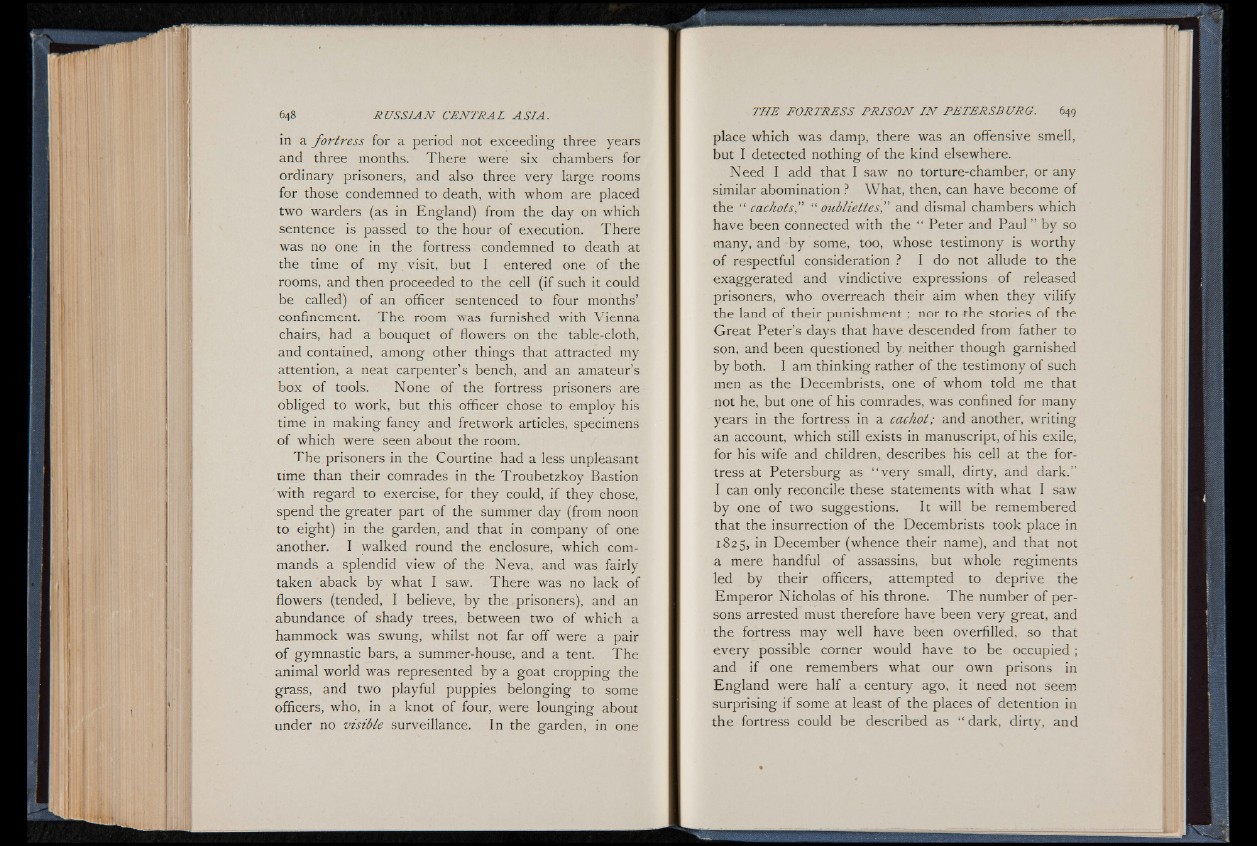
in a fortress for a period not exceeding three years
and three months. There were six chambers for
ordinary prisoners, and also three very large rooms
for those condemned to death, with whom are placed
two warders (as in England) from the day on which
sentence is passed to the hour of execution. There
was no one in the fortress condemned to death at
the time of my visit, but I entered one of the
rooms, and then proceeded to the cell (if such it could
be called) of an officer sentenced to four months’
confinement. The room was furnished with Vienna
chairs, had a bouquet of flowers on the table-cloth,
and contained, among other things that attracted my
attention, a neat carpenter’ s bench, and an amateur’s
box of tools. None of the fortress prisoners are
obliged to work, but this officer chose to employ his
time in making fancy and fretwork articles, specimens
of which were seen about the room.
The prisoners in the Courtine had a less unpleasant
time than their comrades in the Troubetzkoy Bastion
with regard to exercise, for they could, -if they chose,
spend the greater part of the summer day (from noon
to eight) in the garden, and that in company of one
another. I walked round the enclosure, which commands
a splendid view of the Neva, and was fairly
taken aback by what I saw. There was no lack of
flowers (tended, I believe, by the prisoners), and an
abundance of shady trees,. between two of which a
hammock was swung, whilst not far off were a pair
o f gymnastic bars, a summer-house, and a tent. The
animal world was represented by a goat cropping the
grass, and two playful puppies belonging to some
officers, who, in a knot of four, were lounging about
under no visible surveillance. In the garden, in one
place which was damp, there was an offensive smell,
but I detected nothing of the kind elsewhere.
Need I add that I saw no torture-chamber, or any
similar abomination ? What, then, can have become of
the “ cachots,” “ oubliettes," and dismal chambers which
have been connected with the “ Peter and Paul ” by so
many, and by some, too, whose testimony is worthy
of respectful consideration ? I do not allude to the
exaggerated and vindictive expressions of released
prisoners, who overreach their aim when they vilify
the land of their punishment ; nor to the stories of the
Great Peter’s days that have descended from father to
son, and been questioned b y neither though garnished
by both. I am thinking rather of the testimony of such
men as the Decembrists, one of whom told me that
not he, but one of his comrades, was confined for many
years in the fortress in a cachot; and another, writing
an account, which still exists in manuscript, of his exile,
for his wife and children, describes his cell at the fortress
at Petersburg as “ very small, dirty, and dark.”
I can only reconcile these statements with what I saw
by one of two suggestions. It will be remembered
that the insurrection of the Decembrists took place in
1825, in December (whence their name), and that not
a mere handful of assassins, but whole regiments
led by their officers, attempted to deprive the
Emperor Nicholas of his throne. The number of persons
arrested must therefore have been very great, and
the fortress may well have been overfilled, so that
every possible corner would have to be occupied;
and if one remembers what our own prisons in
England were half a century ago, it need not seem
surprising if some at least of the places of detention in
the fortress could be described as “ dark, dirty, and